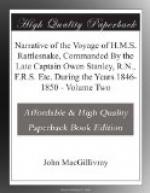Lastly, the Western Australian and the Kowrarega so closely agree in the use of the numeral two for the dual pronoun, that each applies it in the same manner. In the third person it stands alone, so that in Western Australian boala, and in Kowrarega pale = they two, just as if in English we said pair or both, instead of they both (he pair); whilst in the second person, the pronoun precedes it, and a compound is formed; just as if, in English, we translated the Greek sphoi by thou pair or thou both.
1.
Singular : nga-tu = I, me.
Dual : albei = we two, us two.
Plural : arri = we, us.
Here the plural and dual are represented not by a modification of the singular but by a new word; as different from nga as nos is from ego. The tu, of course, is non-radical, the Gudang form being ngai.
Nga, expressive of the first person, is as common as ngi, equivalent to the second. Thus, nga-nya, nga-toa, nga-i, nga-pe = I, me, in the Western Australian, New South Wales, Parnkalla, and Encounter Bay dialects.
Now, the difference between the first and second persons being expressed by different modifications (nga, ngi) of the same root (ng), rather than by separate words, suggests the inquiry as to the original power of that root. It has already been said that, in many languages, the pronoun of the third person is, in origin, a demonstrative. In the Kowrarega it seems as if even the basis of the first and second was the root of the demonstrative also; since, by looking lower down in the list, we find that i-na = this, che-na = that, and nga-du (nga in Gudang) = who. Ina and chena also means here and there, respectively.
The dual form albei reappears in the Yak-kumban dialect of the River Darling where allewa = we two. Arri = us, is also the first syllable in the Western Australian form ar-lingul = we; or, rather it is ar-lingul in a simpler and less compounded form. In a short specimen of Mr. Eyre’s from the head of the Great Australian Bight, the form in a appears in the singular number, ajjo = I and me. The root tana = they, is not illustrated without going as far as the Western Australian of Mr. Eyre. Here, however, we find it in the compound word par-tanna = many. Its original power is probably others; and it is most likely a widely diffused Australian root.
The pronouns in question are compound rather than simple; i.e. instead of nga = me, and ngi = thee, we have nga-tu and ngi-du. What is the import and explanation of this? It may safely be said, that the termination in the Australian is NOT a termination like the Latin met in ego- met, inasmuch as this last is constant throughout the three persons (ego-met, tute-met, se-met), whereas, the former varies with the pronoun to which it is appended (nga-tu, and ngi-du). I hazard the conjecture that the two forms correspond with the adverbs here and there; so that nga-tu = I here, and ngi-du = thou there, and nu-du = he there. In respect to the juxtaposition of the simple forms (ngai, ngi, and nue) of the Gudang with the compound ones (nga-tu, ngi-du, and nu-du) of the Kowrarega, it can be shown that the same occurs in the Parnkalla of Port Lincoln; where Mr. Eyre gives the double form ngai and nga-ppo each = I or me.




